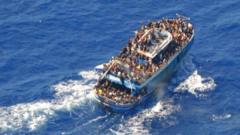Audio evidence points to Greek rescue coordinators possibly directing a migrant boat to reject assistance as it sank, contradicting official versions of events leading up to the disaster.
Leaked Audio Reveals Greek Coast Guard's Involvement in Migrant Boat Tragedy

Leaked Audio Reveals Greek Coast Guard's Involvement in Migrant Boat Tragedy
New recordings raise critical questions about Greece's handling of a catastrophic shipwreck that claimed hundreds of lives.
Leaked audio instructions from Greek rescue coordinators have raised serious doubts about the official narrative surrounding a deadly shipwreck that tragically claimed the lives of up to 650 migrants. The fishing vessel Adriana sank in the early hours of June 14, 2023, in international waters—within Greece's rescue zone—after departing from Libya a week earlier.
Survivors allege that Greek coastguards inadvertently caused the boat to capsize during an ill-fated towing attempt, further claiming they were coerced into silence regarding the incident. The Greek coastguard, however, refutes these accusations, asserting that it did not intervene because the vessel did not signal for help and intended to reach Italy voluntarily.
Emerging audio from the Greek website News247.gr uncovers discussions held within the Joint Rescue Coordination Centre (JRCC) in Piraeus, illustrating nuanced communications before the disaster. One call, recorded at 18:50 local time on June 13, reveals a rescue officer instructing the captain of the migrant boat to inform a responding vessel that the migrants did not wish to head toward Greece.
Despite the coastguard's refusal to comment on the recordings, they have assured the public that all relevant evidence has been submitted to a Naval Court currently investigating the sinking.
The Adriana was estimated to carry around 750 individuals on board when it departed Tobruk, Libya, with the United Nations indicating a grim death toll that includes about 500 presumed deceased, among them women and children. Audio from subsequent calls corroborates the notion that, when asked, passengers expressed a clear desire to avoid Greece and continue their journey to Italy.
The Greek coastguard maintains a record of rescuing over a quarter of a million migrants at sea in the past decade. However, scrutiny over their actions has intensified, especially following a court's dismissal of charges against Egyptian men believed to have been involved in the incident—due to jurisdictional issues surrounding international waters.
Human rights experts and advocates have voiced concerns about a perceived cover-up, emphasizing that many survivors reported being pressured by Greek authorities to manipulate their testimonies, framing the Egyptians rather than acknowledging potential culpability on the part of the coastguard.
Calls for an independent investigation are mounting, led by organizations like Amnesty International and Human Rights Watch, as the Greek Ombudsman actively examines allegations related to this tragic event. As the inquiry unfolds, the implications for the ongoing migrant crisis in Europe—compounded by allegations of negligence and poor treatment of individuals seeking asylum—will continue to reverberate across the region.






















